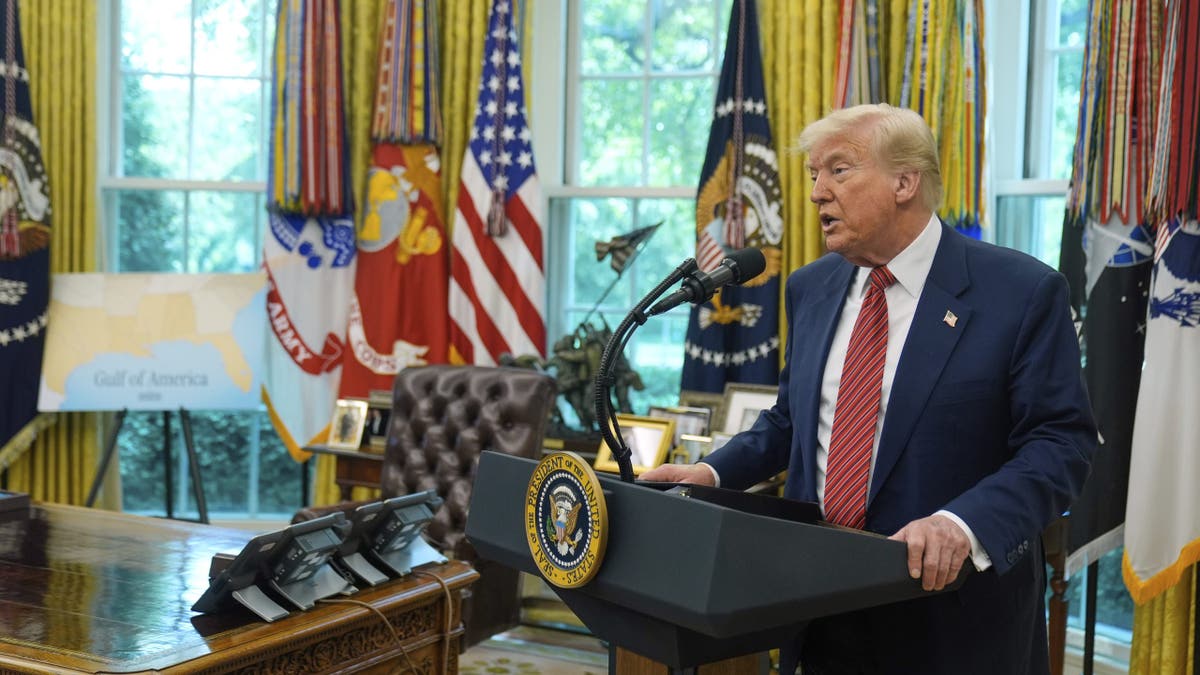NEWYou can now listen to Fox News articles!
The Trump administration is fighting to pause a second court ruling that blocked President Donald Trump’s sweeping and so-called reciprocal tariffs, the signature economic policy of his second term.
The administration’s new appeal, filed Monday in the U.S. Court of Appeals for the D.C. Circuit, comes less than a week after a very similar court challenge played out in the U.S. Court of International Trade (CIT) in New York, and the U.S. Court of Appeals for the Federal Circuit in Washington.
At issue in both cases is Trump’s use of the International Emergency Economic Powers Act to enact his sweeping “Liberation Day” tariff plan. The plan, which Trump announced on April 2, invokes IEEPA for both his 10% baseline tariff on most U.S. trading partners and a so-called “reciprocal tariff” against other countries.
TRUMP TARIFF PLAN FACES UNCERTAIN FUTURE AS COURT BATTLES INTENSIFY
Trump’s use of the emergency law to invoke widespread tariffs was struck down unanimously last week by the three-judge CIT panel, which said the statute does not give Trump “unbounded” power to implement tariffs. However, the decision was almost immediately stayed by the U.S. Court of Appeals, allowing Trump’s tariffs to continue.
But in a lesser-discussed ruling on the very same day, U.S. District Judge Rudolph Contreras, an Obama appointee, determined that Trump’s tariffs were unlawful under IEEPA.
Since the case before him had more limited reach than the case heard by the CIT – plaintiffs in the suit focused on harm to two small businesses, versus harm from the broader tariff plan – it went almost unnoticed in news headlines.
But that changed on Monday.
TRUMP DENOUNCES COURT’S ‘POLITICAL’ TARIFF DECISION, CALLS ON SUPREME COURT TO ACT QUICKLY

Lawyers for the Justice Department asked the U.S. Court of Appeals for the D.C. Circuit – a Washington-based but still separate court than the Federal Court of Appeals – to immediately stay the judge’s ruling.
They argued in their appeal that the judge’s ruling against Trump’s use of IEEPA undercuts his ability to use tariffs as a “credible threat” in trade talks, at a time when such negotiations “currently stand at a delicate juncture.”
“By holding the tariffs invalid, the district court’s ruling usurps the President’s authority and threatens to disrupt sensitive, ongoing negotiations with virtually every trading partner by undercutting the premise of those negotiations – that the tariffs are a credible threat,” Trump lawyers said in the filing.
Economists also seemed to share this view that the steep tariffs were more a negotiating tactic than an espousal of actual policy, which they noted in a series of interviews last week with Fox News Digital.
TRUMP TARIFF PLAN FACES UNCERTAIN FUTURE AS COURT BATTLES INTENSIFY
The bottom line for the Trump administration “is that they need to get back to a place [where] they are using these huge reciprocal tariffs and all of that as a negotiating tactic,” William Cline, an economist and senior fellow emeritus at the Peterson Institute for International Economics, said in an interview.
Cline noted that this was the framework previously laid out by Treasury Secretary Scott Bessent, who had embraced the tariffs as more of an opening salvo for future trade talks, including between the U.S. and China.

“I think the thing to keep in mind there is that Trump and Vance have this view that tariffs are beautiful because they will restore America’s Rust Belt jobs and that they’ll collect money while they’re doing it, which will contribute to fiscal growth,” said Cline, the former deputy managing director and chief economist of the Institute of International Finance.
“Those are both fantasies.”
What comes next in the case remains to be seen. The White House said it will take its tariff fight to the Supreme Court if necessary. Counsel for the plaintiffs echoed that view in an interview with Fox News.
But it’s unclear if the Supreme Court would choose to take up the case, which comes at a time when Trump’s relationship with the judiciary has come under increasing strain.
In the 20 weeks since the start of his second White House term, lawyers for the Trump administration have filed 18 emergency appeals to the high court, indicating both the pace and breadth of the tense court battles.
Read the full article here








